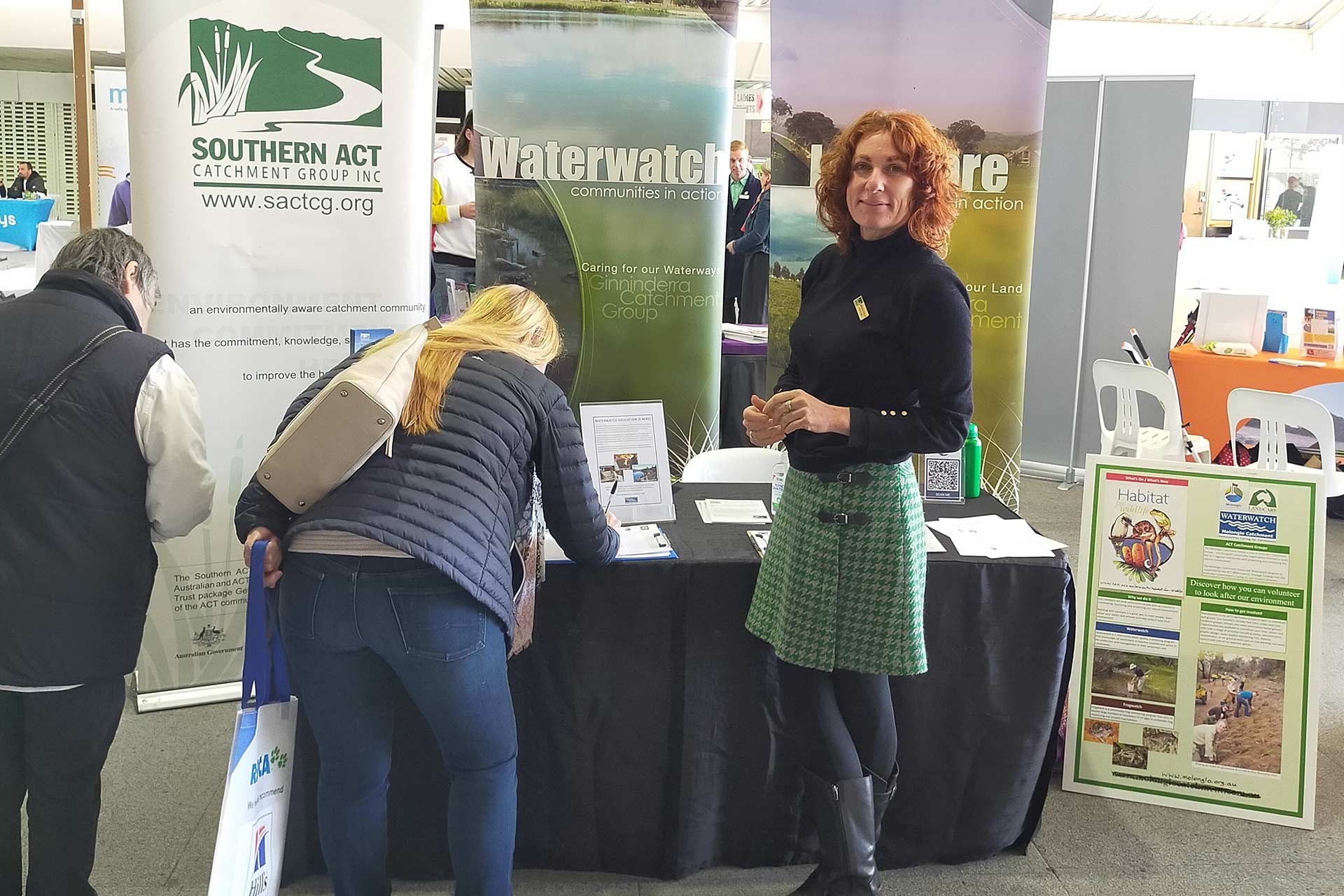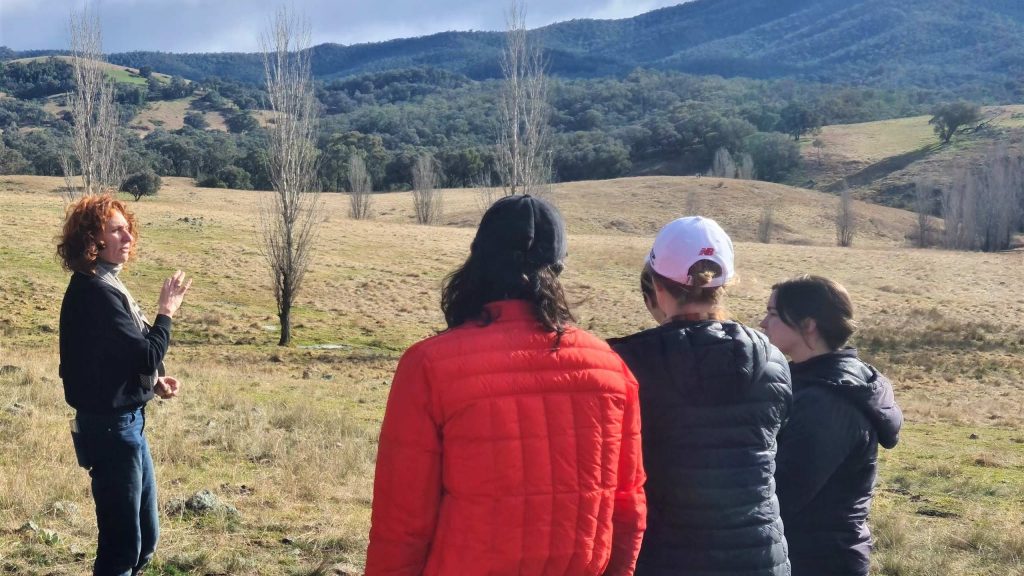It’s all about connection
Martine Franco talks us through what she gets up to in her role at the Southern ACT Catchment Group, supporting her community of volunteers.
Contributed by: Martine Franco
Southern ACT Catchment Group (SACTCG) is one of three community-based catchment groups operating in the ACT. These groups work with the community to deliver environmental projects. They partner with many different non-government organisations, rural landholders and government agencies, and are also involved in citizen science through hosting the community Waterwatch Coordinators. SACTCG’s primary role is to support its members who are the Parkcare, Landcare and Waterwatch volunteers that work across the Southern ACT region.
Martine Franco is the Executive Officer and Catchment Coordinator for SACTCG and manages a small team of staff, including project officers and the group’s Waterwatch Coordinator. Martine has been with SACTCG for nine years and came to the role because of her passion for community empowerment and the natural environment.
Having had a previous career as an Occupational Therapist in community mental health, she has always loved working with people, developing strong relationships and supporting healthier communities. Once she completed her forestry degree, Martine set her sights on Landcare, observing that this movement optimises the human-nature connection and empowers people at the local level to improve natural systems. What drives her is an enthusiasm to build passion and engagement in her community and see the benefits from people working together.

My work is wonderfully varied. A ‘typical’ week will definitely involve talking to some of our 25 member groups (like Friends of Tuggeranong Hill or Mt Taylor ParkCare Group). This can be about things like innovative ideas for a new project, giving advice about ecological communities needing protection in areas where volunteers are working, doing site visits to feed into a new grant application, informing member groups about government approval processes for on-ground work, and linking groups with other resources. I work with our team to organise workshops and training for volunteers, as well as things like guest speakers for our new Women in Agriculture Network.
I might also meet rural landholders to talk about ideas for projects, linking them with neighbours and even with volunteer groups when they identify similar challenges and goals. Projects might include things like weeding a patch of habitat which is important for a threatened species, or revegetating a piece of eroding public land.
I often help volunteer groups and landholders with securing funding for their projects. SACTCG looks after the administrative side (a.k.a. the boring bits) of grants for many of our member volunteer groups – this includes writing applications, managing the budget, managing consultants and contractors, organising volunteer work parties, and reporting on the project once it is finished. I write applications for at least 10 grants a year with support from our great staff, and we always have a lot of projects on the go.
Volunteers might pop into the office for a cup of tea to talk about a new idea, or to work through a challenge they’re facing. I also talk to community members who have not yet become involved in volunteering, who call me for advice about an issue they are concerned about – like blue green algae on Lake Tuggeranong. I can generally help out by linking them up with an established group working on that issue, or help them to set up their own group if that’s what they want.
Talking to ACT Government staff from different parts of government is another important part of what I do. This includes the ACT Natural Resource Management unit, Parks and Conservation Service ranger staff and managers, and Parks and Places staff – different areas of government will get involved with projects depending on where the work is taking place. I also work with partners like Greening Australia, Upper Murrumbidgee Catchment Network (with whom I am a committee member), universities, and the other ACT catchment groups. I also have a role with our peak body, Landcare ACT, on their Members’ Council. This is a forum where I represent the views of our volunteer community at the Territory and national level.
In addition to this, I do all the work you would expect to be part of running any organisation, such as managing staff and an office, administration, and charity financial reporting. For SACTCG, this also means talking to my management committee (all volunteers) about what our members need from us, funding for the group, and new strategic directions we want to explore. I work closely with our treasurer and bookkeeper to meet the requirements of running an organisation that is a not-for-profit association. I am also our media spokesperson!
Communication and collaboration are key elements of what I do, whether working with a volunteer weeding their local park, or a government minister. The beauty of the way the catchment group operates is that we work with anyone and everyone, and as a result, we can often link up people who would not otherwise connect with each other.
SACTCG is an amazing organisation that gets more done than seems possible for such a small set up. This is because of the strong and enduring relationships we have with the community and the passion of those I get to deal with every day. Our Waterwatch Coordinator, Martin, has been supporting his volunteers in the Southern ACT for 13 years, while our project officer Fiona has been involved in volunteering in this area for over 20 years. I love that my job involves talking to lots of people every day, from scientists to corporate volunteers, pulling together ideas and solutions to environmental issues, and getting more people involved. I also love being the go-to person for the community, connecting people with resources and building the knowledge and skills of people looking after our beautiful natural places.


